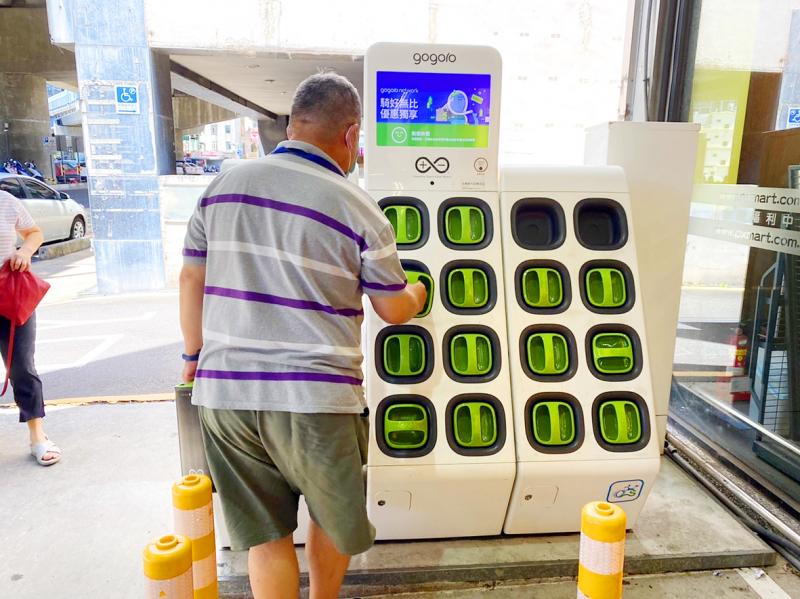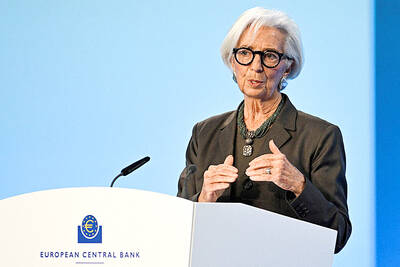Gogoro Inc (睿能創意), a leading Taiwan-based electric scooter brand, is to receive the Global Company of the Year Award from Frost & Sullivan.
Gogoro, the only Taiwanese company to have received the award, was chosen based on the California-based research and consulting firm’s analysis of the swappable battery electric scooter market.
Frost & Sullivan said it chose Gogoro because of the success of its Gogoro Network, “an intelligent energy platform that combines the power of connectivity, artificial intelligence and machine learning to create a new generation of swappable refueling that is smart, scalable and continually optimizing itself.”

Photo: Hung Mei-hsiu, Taipei Times
Under the network, the number of Gogoro’s battery swap stations, called GoStations, has grown from 70 in 2015 to almost 2,000 this year, with nearly 360,000 customers using the stations every month, Frost & Sullivan said.
“Gogoro strategically places these stations every 500 meters in places such as malls, convenience stores, parking structures and coffee shops. It has established consumer battery swapping on a mass scale, performing 265,000 battery swaps each day (135 million to date),” Frost & Sullivan said in a statement. “It demonstrates that its business model is viable and practical.”
Gogoro is set to launch similar services in cities outside of Taiwan, Frost & Sullivan research director Vishwas Shankar said.
“As a testament to its success with GoStations, its vehicles and the overall Gogoro Network, the company’s ridership developed their own community, forming multiple forums and networks and becoming ambassadors for climate change and clean energy transportation,” Shankar said.
The model is so successful that China Motor Corp (中華汽車), an automaker which sells electric scooters under the brand eMoving, announced last month that it has joined the Powered By Gogoro Network.
China Motor, which is part of the auto conglomerate Yulon Group (裕隆集團), is the latest company to join the alliance, making eMoving Gogoro’s fifth partner, following Yamaha Motor Co, Aeon Motor Co (宏佳騰), Motive Power Industry Co’s (摩特動力) PGO and Suzuki Motor Corp’s eReady.

European Central Bank (ECB) President Christine Lagarde is expected to step down from her role before her eight-year term ends in October next year, the Financial Times reported. Lagarde wants to leave before the French presidential election in April next year, which would allow French President Emmanuel Macron and German Chancellor Friedrich Merz to find her replacement together, the report said, citing an unidentified person familiar with her thoughts on the matter. It is not clear yet when she might exit, the report said. “President Lagarde is totally focused on her mission and has not taken any decision regarding the end of

French President Emmanuel Macron told a global artificial intelligence (AI) summit in India yesterday he was determined to ensure safe oversight of the fast-evolving technology. The EU has led the way for global regulation with its Artificial Intelligence Act, which was adopted in 2024 and is coming into force in phases. “We are determined to continue to shape the rules of the game... with our allies such as India,” Macron said in New Delhi. “Europe is not blindly focused on regulation — Europe is a space for innovation and investment, but it is a safe space.” The AI Impact Summit is the fourth

CONFUSION: Taiwan, Japan and other big exporters are cautiously monitoring the situation, while analysts said more Trump responses ate likely after his loss in court US trading partners in Asia started weighing fresh uncertainties yesterday after President Donald Trump vowed to impose a new tariff on imports, hours after the Supreme Court struck down many of the sweeping levies he used to launch a global trade war. The court’s ruling invalidated a number of tariffs that the Trump administration had imposed on Asian export powerhouses from China and South Korea to Japan and Taiwan, the world’s largest chip maker and a key player in tech supply chains. Within hours, Trump said he would impose a new 10 percent duty on US imports from all countries starting on

STRATEGIC ALLIANCE: The initiative is aimed at protecting semiconductor supply chain resilience to reduce dependence on China-dominated manufacturing hubs India yesterday joined a US-led initiative to strengthen technology cooperation among strategic allies in a move that underscores the nations’ warming ties after a brief strain over New Delhi’s unabated purchase of discounted Russian oil. The decision aligns India closely with Washington’s efforts to build secure supply chains for semiconductors, advanced manufacturing and critical technologies at a time when geopolitical competition with China is intensifying. It also signals a reset in relations following friction over energy trade and tariffs. Nations that have joined the Pax Silica framework include Japan, South Korea, the UK and Israel. “Pax Silica will be a group of nations